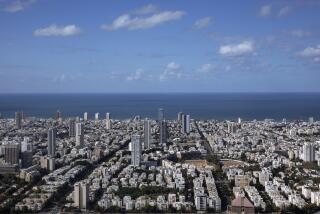South Africa Will Censor All Unrest Reports
- Share via
JOHANNESBURG, South Africa — The government, convinced that a Communist-led revolution is gaining ground in South Africa, will extend its restrictions on the news media and begin censoring all reports on the country’s political unrest, a top official said Wednesday.
Stoffel van der Merwe, the deputy minister for information, said that all reports of the continuing civil strife in South Africa and comments critical of the government will have to be approved for publication by Cabinet ministers, their deputies or spokesmen.
Seek to Curb Reports
Van der Merwe said that the new restrictions, which will go into effect today, are aimed at curbing reports on “all sorts of resistance” that the government sees as a still-growing threat despite the much reduced level of violence around the country.
Because the new measures stop short of a full government review of everything published here--editors and foreign correspondents will have to decide for themselves whether the material falls within the regulations and then seek official authorization--Van der Merwe argued that this will not be true censorship. But he added that the government might go to full press censorship if the new system does not work.
Imposed under the six-month-old national state of emergency, which gives President Pieter W. Botha’s government virtually the authority to rule by decree, the new regulations will make it a crime, punishable by 10 years in prison, to report on much of South Africa’s anti-apartheid movement without government approval.
Van der Merwe, at a meeting with members of the Foreign Correspondents Assn., described the new measures as “fairly wide-ranging” and said they will go well beyond those adopted so far during the emergency, They will regulate reporting on “a long list of things,” such as consumer boycotts, rent strikes and other nonviolent protests that will be included under a much broader definition of “unrest.”
Although personally opposed to such censorship, Van der Merwe defended the new regulations as necessary to deal with what he said is “a calculated, well-planned revolutionary onslaught” that intelligence reports show is threatening the government.
Terrorism Expected
He cited likely terrorist attacks on the 25th anniversary next week of Spear of the Nation, the military wing of the African National Congress, as well as the black consumer boycott planned for Christmas, the campaign to free children held as political detainees and other anti-apartheid activities.
Not only is the situation “not improving at the rate we would like to see,” Van der Merwe contended, but radicals increasingly are using “legitimate political activities . . . to advance their revolutionary aims.”
The new restrictions on news media, Van der Merwe said, are part of a series of measures designed to fight what he repeatedly described as “a growing Communist threat” to the country.
“The government’s aim is not to establish a totalitarian system,” he added. “It is to establish a democratic system. . . . But in doing that we have to touch upon elements that are normally part of the free democratic process, but that in this context have become part of the revolutionary movement.”
Many Critics
The measures were nevertheless sharply criticized by journalists, newspaper publishers, civil rights groups and others.
“Government today imposes what we believe will be a total blackout on whatever news it regards as undesirable,” the Johannesburg newspaper Business Day said in an editorial today. “Government’s justification for this action is that South Africa is under a ‘revolutionary onslaught.’ We do not doubt for a moment that this is true. But government, in its mad pursuit of a failed ideology which it does not have the courage to change, continues to treat symptoms rather than causes.”
But Business Day argued that the world is also to blame, for by “alienating” the country’s white-led minority government it “has in effect pushed South Africa into dictatorship and has licensed the revolutionaries to step up their campaigns of violence.”
Peter Soal, a member of Parliament from the opposition Progressive Federal Party, commented: “There is no doubt that we are moving into a greater phase of repression, that reform is gone and that these measures are just the start of a general crackdown that will destroy what little is left of democracy in this country.”
Murphy Morobe, acting publicity secretary of the United Democratic Front, a coalition of 700 anti-apartheid groups, commented, “It is typical of all fascist regimes that the press and freedom of expression are the first victims. We may be affected some, but it will not stop our work.”
Ostrich Attitude
And the all-black Media Workers Assn. rejected the government contention that “the demands of the oppressed and exploited are ‘a coordinated revolutionary onslaught.’ When the oppressed have decided they want justice, no force will stop them,” the group said. “The government can continue to bury its head in the sand, but like the ostrich it forgets that its backside is out in the open.”
One effect of the regulations, Van der Merwe acknowledged, could be an unprecedented restriction on South Africa’s parliamentary system, because the regulations will apply to critical comments by opposition members of Parliament, whether from the left or the right. Parliament members may continue to speak out, Van der Merwe said, but the press would be barred from reporting what they had said unless the government agreed.
Even tougher restrictions will be enforced, other government sources said, against a wide range of anti-apartheid and civil rights groups, including the United Democratic Front, so that almost nothing that they say may be published. Most political meetings are already prohibited under emergency regulations, so the effect would be to silence the government’s toughest opponents.
Earlier Restrictions
Until now, newsmen have been prohibited from all first-hand coverage of unrest, from reporting any police or army actions without permission, from identifying political detainees and from publishing “subversive statements.” The regulations apply to both South African and foreign news media.
But newsmen had found ways around some of the restrictions, and courts had thrown out a number of regulations as beyond the government’s powers or too vague to be enforceable. Van der Merwe acknowledged that their effectiveness has been “eroded” over the past six months.
(In advance of the new restrictions on the media, the government said Tuesday that it has refused to renew the work permit of Times correspondent Michael Parks and has told him to leave South Africa by Dec. 31. The Department of Home Affairs gave no reason for the impending expulsion.)
The deaths last weekend of two more black trade unionists in fighting with political rivals near Durban were reported Wednesday. The government’s Bureau for Information said that two members of the Metal and Allied Workers Union died as a result of injuries suffered in a clash Sunday with Inkatha, the Zulu political movement loyal to Chief Mangosuthu Gatsha Buthelezi. Four other union members were killed in other clashes Friday and Saturday near Pietermaritzburg, also in Natal province.
Chemical Industry Strike
Thousands of chemical industry workers stopped work Wednesday in protest against a government order deporting an organizer for the Chemical Workers Industrial Union. Thirteen firms have asked that the order be rescinded, and other companies are expected to join them in the protest.
Two senior officials of the National Union of Mineworkers were ordered to leave South Africa within five days, according to a union spokesman, who warned that “the state is clearly looking for a confrontation with the trade union movement.” Both men are citizens of the nominally independent tribal homeland of Transkei.
More to Read
Sign up for Essential California
The most important California stories and recommendations in your inbox every morning.
You may occasionally receive promotional content from the Los Angeles Times.













